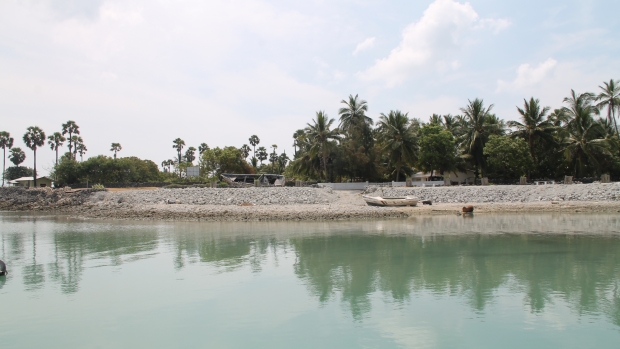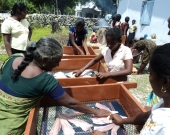Grants :: Small Grant Facilities :: Alternative Livelihood to the Women in Delft Fisher Community
Alternative Livelihood to the Women in Delft Fisher Community

Delft Island, Delft Island © Kumudini Ekaratne, IUCN SL, 2014
Objectives
Increase the income of women in the Delft fisher community by 60%
Background
Delft is a flat island surrounded by shallow waters and beaches of coral chunks and sand. The vegetation is of a semi-arid tropical type, with Palmyra palms, dry shrubs and grasses that grow on coralline soil. Its coordinates are 9°30'0" N and 79°42'0" E in DMS. The Climate is dry as in the rest of the northern province of Sri Lanka; safe drinking water is an issue for the inhabitants, dug wells in the particular area partially fulfill the needs, while a RO plant operated by the Sri Lankan Navy serves as integration.
The island exports all the products to the main land; fishery products are purchased by southern buyers. The price of the fish is usually fixed by the buyers, since the fishermen don’t have alternatives to sell their products to a fair price.
The community based organizations are functioning at their maximum ability, the fishermen cooperatives societies are well-organized and provide a good service to the communities.
There are some initiatives in order to develop the island as a tourist attraction. Construction work is in progress to build a hotel to cater the need of tourism development.
As to livelihoods, agriculture is possible only in one Grama Niladari division (Village headman): vegetables, chili, onions, Palmyra root (Panamkilangu) are the items produced in the Maha seasons. Cattle and goat rearing is also practiced in the community but its contribution to the household income is very limited.
Fishing is the main livelihood to the majority population in Delft with traditional methods, and the use of fiberglass boats and kerosene powered engines. There are a total of 360 plastic boats and 50 canoes (kaddumaram) on Delft which are used for fishing by 1,200 individuals in 560 families. Eighty (80) families are engaged in the fish drying business using traditional methods. Access to the market is especially difficult for the population of Delft, since it takes 90 minutes by boat to reach the Jaffna mainland.
Fresh fish used to be purchased by outsiders of the island, mostly from Colombo-based companies. At present the fishermen are unable get a good harvest and the most demanded varieties are very rare to be found. Due to this, there is a potential that the fishermen will start practising some of the banned fishing methods which would be harmful for the aquatic resources. In this context, one solution is to provide the community with an alternative livelihood through fish value addition.
The hygienically processed dry fish is sold at fair prices in the markets. through this project, 40 women will be trained on hygienically producing dry fish and will be provided with the necessary equipment. The Fishermen cooperative society will then facilitate the marketing of their produce in the southern markets, with the assistance of Sevalanka.
While receiving support to initiate the value addition process, the fishermen community will be educated on the conservation of coastal resources with the active involvement of the Coast Conservation and Coastal Resource Management Department. .
Target beneficiaries
40 women in Delft Island fisher community
Outputs
1. Women are educated to practice hygienic fish drying methods.
2. Supply Chain Analysis report for dry fish products
3. Fishermen cooperative societies linked with southern markets.
4. Awareness on Conservation of coastal resources improved among the community.
Accomplishments and challenges
Though the project aimed to increase the income of the 40 beneficiary families by 60%, the average increase recorded is 31%; range 19%-52%.
Contributions to cross-cutting themes
The project builds awareness on conservation of the coastal resources through awareness programmes. Through this programmes, the communities will be educated on possible impacts by climate changes in the region and to address these issues with a community-based approach.
The project is directly supporting 40 women to establish income generation activities: these activities further encourage the women in the community to take action and act for further development of their livelihoods as producer groups. The implementing agency, Sevalanka foundation, will work on the formation of these producer groups, legally registering them as co++mmunity based organization.
Lessons Learned
The main activity focused on the training of women and then linking them to a marketing places, but when it comes to linking the products to the markets the market requirement for selling such products was different to what was expected, for example packing and branding etc. In future these factors need to be looked at during the planning stage.
Related News
Health N’ Delft: New way of drying fish attracts health-conscious market for Delft Island fishers
Delft Island, Sri Lanka 03 Sep 2015
Country: Sri Lanka
Topic: Sustainable Livelihoods
MFF SGF project introduced a new method of drying fish to fisher women of the Delft Island.
Project Facts
Country
Location
Delft Island
Topic
Duration
1st Jun 2014 to 31st May 2015
MFF Grant Amount
LKR 1,973,400
Co-financing Partner
Coast Conservation and Coastal Resource Management Department
Delft Fishermen cooperative Societies Union LTD (LKR 25,000/=)

